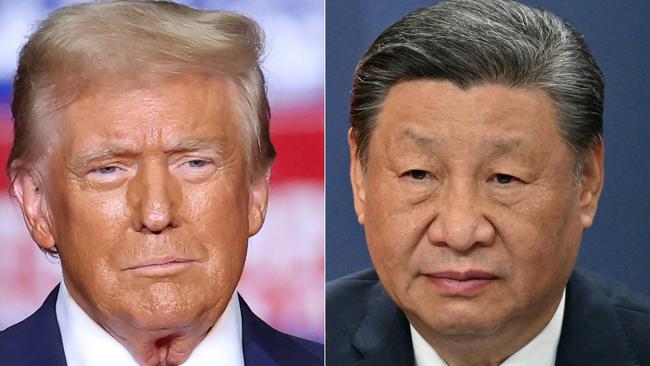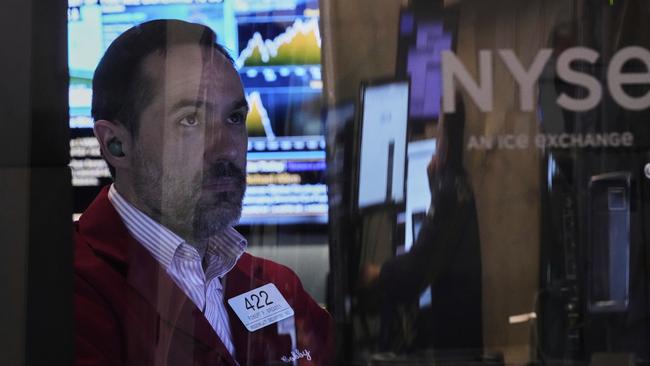Stocks lift as investors rotate away from US
Donald Trump’s radical agenda to up-end the global trade order is part of a broader structural reset — and he still has the support of Middle America, investors say.

Donald Trump’s radical agenda to up-end the global trade order is part of a much broader structural reset and, crucially, he still has the support of Middle America to push ahead, investors say.
A second day of calm on markets lifted Australian shares on Tuesday, even as investors mull the prospect of a global recession and the implications of a rotation away from US exceptionalism.
The S&P/ASX 200 advanced 0.17 per cent in afternoon trade to 7761.7 points, led by healthcare stocks and financials as the consumer, tech and property sectors all finished in the red.
The slight ASX gain followed a positive session on Wall Street overnight which saw both the S&P 500 and the Dow Jones indexes close 0.8 per cent higher, as the technology-heavy Nasdaq rose 0.6 per cent. That came after investors embraced Trump’s partial tech exemptions and possible relief for carmakers.
A key concern for investors is where the market goes from here as we brace for months of tariff negotiations and further chest thumping from leaders in the US and China.
SG Hiscock sees Australian shares struggling to make any substantial gains given the current uncertainties. More broadly, the boutique investment manager is warning of a structural change taking place as part of the US President’s protectionist strategy.
“We’ve seen a bit of a relief rally but it’s hard to see the sharemarket move higher with confidence until we get some more certainty around policy and where things are going (with tariffs). That could take quite some time,” SG Hiscock portfolio manager Hamish Tadgell told The Australian.
“But this is not just about tariffs. There’s a structural change going on here, a reset. There’s been a clash of the pandemic, hot wars, geopolitics, inequality, and it’s all coming to a moment where we’re now getting this recalibration,” he said.
“This is guns and butter,” he added, implying the US would push for broader negotiations than trade as it looks to improve its fiscal position.

Escala Partners vice chairman Chris Selby, speaking to The Australian from New York, said President Trump still had the support of middle America as he warned of a slowing of capital flowing to businesses.
“Main Street is still giving Trump the benefit of the doubt. They’re still employed and cost pressures haven’t filtered through yet,” he said. As workers hope the US President will deliver on his promises, investment banks are going through a major reassessment of their exposures, he added.
“They’re not saying there’s massive impairments or risk... but because everything’s shifting, they can’t really assess (properly), and that means there’s a slowing of capital. They’re cautious, and that tells you that things will slow down,” Mr Selby warned.
The US President’s pause on reciprocal tariffs has injected some short-term composure into equity markets even as the administration homes in on sector targets. The US is already looking to the next phase of its tariff war, this time on pharmaceuticals and microchips, according to government filings on Monday. Separately, US commerce secretary Howard Lutnick has indicated tariffs on these industries may come in the next month or two.
Healthcare stocks exposed to the US were buoyant on Monday: CSL jumped 2.4 per cent to $243.67, Ansell rose 1.2 per cent to $29.39, Resmed gained 0.6 per cent to $33.80, and Cochlear was also up 0.6 per cent to $262.46.
The gains followed a Morgan Stanley report naming CSL and Resmed as the investment bank’s preferred healthcare exposures ahead of any tariffs heaped on the industry.
The investment house estimated Ansell would need to increase prices by around 6 to 7 per cent as a result of US tariffs, while Resmed would need to lift its prices by around 2 to 3 per cent and CSL and Fisher & Paykel Healthcare just 1 per cent.
Financials did much of the heavy lifting through the session, with Commonwealth Bank finishing half a per cent higher at $158.04, as peers NAB, ANZ and Westpac all rose between 0.6 and 0.8 per cent.

As equities tread water while waiting to see where the US administration goes from here, market watchers are bracing for a global slowdown, if not a full-blown recession.
“With policymaking and announcements so erratic, markets are going to sort of keep swooning here, there and everywhere. So I still see a greater than 50 per cent chance of a (global) recession,” GSFM market strategist Stephen Miller said.
“There’ll still be protectionism (tariffs) … and the economy is in for a challenging times. We’re looking at a stagflation-like type environment here. And while there might be a lot of volatility, equity markets will struggle to make any significant gains,” he warned.
Pepperstone head of research Chris Weston said economic data, funding markets and commentary from US corporates through earnings season would be key to watch in the coming weeks.
“We’re already seeing companies getting shut out of the debt markets now. IPOs have been shelved and companies that want to go out and raise capital and address balance sheet issues through the debt markets can’t do it anymore.
“If things turn around and get worse, then the market will front-run the idea that something more needs to happen (including the US Federal Reserve stepping in). There’s things the Fed can do there in terms of liquidity and that, but the problem is no one wants US dollars at the moment. We could be seeing a longer-term structural change taking place in the dollar,” he warned.
As investors brace for the prospect of recession, Australia has the advantage of lower tariffs and a central bank at an earlier stage of the rate-cutting cycle.
The Reserve Bank minutes from its April meeting, released on Tuesday, showed the board feared easing this month would jeopardise the progress made on inflation. But, the bank indicated it was open to a rate cut at its May meeting.






To join the conversation, please log in. Don't have an account? Register
Join the conversation, you are commenting as Logout